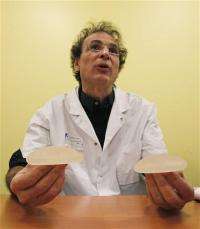Dr. Maurice Mimoun, a plastic surgeon at the St Louis hospital, holds silicone gel breast implants made by French company Poly Implant Prothese, or PIP, that he removed from a patient because of concerns that they are unsafe, Paris, Wednesday, Dec. 21, 2011. French health authorities are considering whether to suggest that an estimated 30,000 women in France get their breast implants removed, amid warnings by leading doctors about risks of rupture and possible cancer risks. (AP Photo/Michel Euler)
(AP) -- Tens of thousands of women with risky, French-made breast implants should have them removed at the state's expense, the health minister recommended Friday, adding that such removals were "preventive" and not urgent.
While implants made by Poly Implant Prothese, or PIP, have not been linked to an increased incidence of cancer, the risk that they could rupture and leak a questionable type of silicone gel has been shown, Xavier Bertrand said in a statement.
"As a preventive measure not of an urgent nature, (French authorities) recommend that the removal of these implants, even those not showing signs of deterioration, be proposed," the statement said. It added that the costs of removal would be footed by France's national health care system - presumably solely for French patients.
Some 30,000 of women in France, Britain, Italy, Spain, Portugal and other countries in Europe and South America have had implants made by PIP. Health authorities in those countries have been following the French decision closely and could make similar recommendations, too. The implants in question were not sold in the U.S.
Women who have had their implants burst and leading French plastic surgeons had been urging the government to act. The death last month of a woman who had the implants and developed a rare cancer catalyzed worries.
About 2,000 Frenchwomen given pre-filled silicone gel implants made by PIP have filed legal complaints against the company, based in southern France. Investigators say it saved euro1 million ($1.3 million) a year by using industrial silicone instead of more expensive silicone meant for medical use.
The French government ordered a halt to production of the implants last year and the company is being liquidated.
The main concern of doctors and patients is the uncertainty surrounding the risks of the silicone used.
"I don't know what might be inside of me," said Annie Mesnil, 62, who had a breast removed after cancer in 1999, and was given a PIP implant.
After the product was recalled last year, a mammogram and ultrasound did not reveal any problem with her implant. But she had it removed anyway, at her own expense, out of fear. When her surgeon took it out and studied it, "he discovered it had already burst."
Health officials from several European countries held a conference call Wednesday to discuss the implants.
The health council of Italy's health ministry held an emergency session Thursday to discuss the pending French decision, and asked hospitals to track down women who received silicone implants made by PIP. The ministry estimates that about 4,000 PIP implants are in use in Italy.
The ministry's health council also said the national health system would pay to have the implants removed if medical conditions required it, such as if they ruptured.
While saying there was no proof of any greater cancer risk among women with PIP implants, the council suggested that women with the implants contact their surgeons because there's a "greater probability of rupture and inflammatory reaction."
British health authorities say they see no reason so far to have the French-made implants systematically removed, and have said that there is not enough evidence of a link between silicone implants and cancer.
In the U.S., concerns about silicone gel implants in general led to a 14-year ban on their use. Silicone implants were brought back to the market in the U.S. 2006 after research ruled out cancer, lupus and some other concerns.
©2011 The Associated Press. All rights reserved. This material may not be published, broadcast, rewritten or redistributed.



















